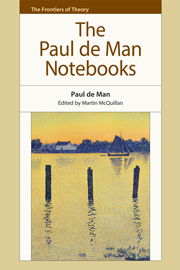Book contents
- Frontmatter
- Contents
- Series Editor's Preface
- Acknowledgements
- Dedication
- Introduction: ‘The Unimaginable Touch of Time’: The Public and Private in the Notebooks of Paul de Man
- PART I Texts
- 1 The Drawings of Paul Valéry (1948)
- 2 Jacques Villon (1952)
- 3 Graduate Essay on Keats (1954)
- 4 Postdoctoral Essay on Symbolism (c. 1960)
- 5 Introduction to Madame Bovary (1965)
- 6 Introduction to The Portable Rousseau (1973)
- 7 On Reading Rousseau (1977)
- 8 Translator's Introduction to “Rousseau and English Romanticism” (1978)
- 9 Rousseau and English Romanticism (1978)
- 10 Introduction to Studies in Romanticism (1979)
- 11 Hommage à Georges Poulet (1982)
- 12 A Letter from Paul de Man (1982)
- 13 Reply to Raymond Geuss (1983)
- 14 Interview with Robert Moynihan (1984)
- PART II Translations
- PART III Teaching
- PART IV Research
- Appendix. The Notebooks of Paul de Man 1963–83
- Bibliography
- Index of Names
3 - Graduate Essay on Keats (1954)
from PART I - Texts
Published online by Cambridge University Press: 05 December 2014
- Frontmatter
- Contents
- Series Editor's Preface
- Acknowledgements
- Dedication
- Introduction: ‘The Unimaginable Touch of Time’: The Public and Private in the Notebooks of Paul de Man
- PART I Texts
- 1 The Drawings of Paul Valéry (1948)
- 2 Jacques Villon (1952)
- 3 Graduate Essay on Keats (1954)
- 4 Postdoctoral Essay on Symbolism (c. 1960)
- 5 Introduction to Madame Bovary (1965)
- 6 Introduction to The Portable Rousseau (1973)
- 7 On Reading Rousseau (1977)
- 8 Translator's Introduction to “Rousseau and English Romanticism” (1978)
- 9 Rousseau and English Romanticism (1978)
- 10 Introduction to Studies in Romanticism (1979)
- 11 Hommage à Georges Poulet (1982)
- 12 A Letter from Paul de Man (1982)
- 13 Reply to Raymond Geuss (1983)
- 14 Interview with Robert Moynihan (1984)
- PART II Translations
- PART III Teaching
- PART IV Research
- Appendix. The Notebooks of Paul de Man 1963–83
- Bibliography
- Index of Names
Summary
It is hard to make up one's mind about John Keats: is he, or is he not, a “difficult” poet? Should one approach him in the broad and tolerant frame of mind with which one listens to a certain kind of romantic music: ignoring some local imperfections or vagueness for the sake of the overall mood? Or should we focus on the minute, interrogate every word, blame ourselves when we do not understand, assume that the final gracefulness is the result of a highly deliberate subtlety? Should he be read slowly, with constant repetitions, or should one be carried away by the general movement?
Reading his commentators may help to put one in the right frame of mind, although they grow more numerous all the time. Not that they elucidate as it were by convergence: never was there a more bewildering array of opinions, all pulling in different directions. But all of them are so deeply convinced and convincing that one always ends up believing the last one read. Armed with this conviction, one tackles the next one, only to lose one's footing once more, then to regain a different assurance as the new article progresses. This is perhaps the key to the problem: Keats is a poet of bewilderment and metamorphosis, one of the first, perhaps, of the modern polyvalent poets allowing for many interpretations, and all the more puzzling since, unlike his later poetic kin, he is not himself aware of it. Naively complicated poets are the hardest to cope with. One reads Mallarmé prepared to deal with higher mathematics; one can train one’s mind for that sort of thing. But nothing is more frustrating than to be forcing advanced calculus on a problem that may turn out to be elementary arithmetic. In Keats’s case, who can tell?
- Type
- Chapter
- Information
- The Paul de Man Notebooks , pp. 42 - 47Publisher: Edinburgh University PressPrint publication year: 2014



